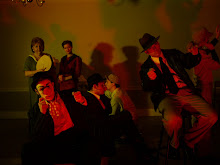 On January 31, 2009 Red Tape Theatre hosted the first Chicago Fringe Artists Networking Night (CFANN). The event brought dancers, musicians, painters, sculptors, performing artists and playwrights into our home for one amazing night.
On January 31, 2009 Red Tape Theatre hosted the first Chicago Fringe Artists Networking Night (CFANN). The event brought dancers, musicians, painters, sculptors, performing artists and playwrights into our home for one amazing night.


 On January 31, 2009 Red Tape Theatre hosted the first Chicago Fringe Artists Networking Night (CFANN). The event brought dancers, musicians, painters, sculptors, performing artists and playwrights into our home for one amazing night.
On January 31, 2009 Red Tape Theatre hosted the first Chicago Fringe Artists Networking Night (CFANN). The event brought dancers, musicians, painters, sculptors, performing artists and playwrights into our home for one amazing night.


Ibsen "had wished to do the club a service, he might almost say a great favor, by bringing its members abreast with contemporary ideas. No one could escape these mighty developments. Not even here - in this community - in this duckpond! He did not actually use the word duckpond but the contempt around his mouth proclaimed it loudly. And how had his offer been received? As a criminal attempt! Rejected by a paltry couple of votes. And how had the women reacted - the women for whom his gift had been intended? They had intrigued and agitated against him. They had thrown his gift into the mud. What kind of women are these? They were worse - worse than the dregs, worse than scum... Thump! A lady, Countess B., fell to the floor."
4 April 1872
"My dear friend, the liberals are the worst enemies of Freedom. Spirtiual and intellectual freedom flourish best under absolutism; that was proved in France, then in Germany and it is now being proved in Russia...
"You say everyone in the faculty of philosophy is against you... If they did not bar the door against you it would show that you had failed to frighten them...
"How this mortal combat between two epochs will end, I do not know; but anything is preferable to the status quo - of that I am certain. I do not promise myself that victory will result in any permanent improvement; every historical development has been but a lurch from one delusion to another. But the battle itself is good, healthy and invigorating; your revolt is a mighty and emancipating declaration of genius...
"Do not rely implicitly on everyone who joins you; what matters is whether they do so for the right reason... my own conviction is that the strongest man is he who stands most alone. But I sit here outside it all while you stand there in the midst of the storm; that makes a big difference."
"It has become customary to expect from tragic characters a loftiness, a purification, a greatness of thought and expression, will and action, that shall fulfill the function of the Greek cothurn - namely to give us the feeling that we are outside the realm of everyday life. But this achieves the exact opposite of its purpose. The world portrayed by the dramatist is rendered completely foreign to the spectator... so he cannot fully engage our sympathy."
"Every notable human being is symbolic, both in his career and in his relationship to history. But bad writers, misconstruing the theory that the significant phenomena of life should be intensified in art, make this symbolism conscious... Instead of it existing hidden in the work, like a vein of silver ore in a mountain, it is continually being dragged into the light of day."
"I hope someday to get him to be himself and turn away from all this damned pastiche. The day Ibsen admits he is small he'll become a perfectly enchanting poet... The point is, he's a rather small and gnomish little chap, with no chest or rump, so he feels that as he has no other gifts he has to strain most fightfully when he writes. And so he doesn't write what he'd really like to, and could."
"The play aroused a storm of hostility... When, in my comedy, as best I could, I cracked the whip over the problem of love and marriage, it was only natural that the majority should rush shrieking to the defense of those institutions. Not many of our critics and readers have acquired the intellectual dicipline and training which enable a man to recognize delusions... The only person who approved of the play was my wife."
